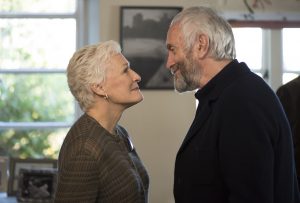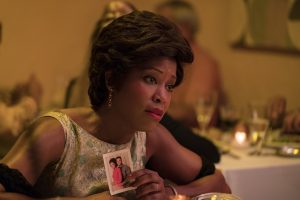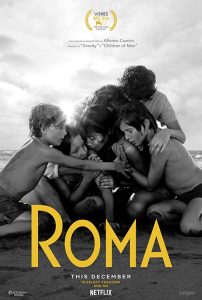Who Will Win This Year’s Oscars?
It’s that time of year again – time for my predictions of the winners at the upcoming annual Academy Awards. Handicapping this year’s winners has been a little more difficult than usual, since there don’t appear to be any clear-cut front runners in several categories, and the nominees in many of the contests leading up to the Oscars have been inconsistent at best. Nevertheless, with that said, here are my picks for who will likely take home statues in the top six categories this year:
Best Actor

Oscar nominee portrays Rami Malek portrays Freddie Mercuty, lead singer of the legendary rock band Queen, in “Bohemian Rhapsody.” Photo by Alex Bailey @ 2018 Twentieth Century Fox Film Corporation.
The Field: Christian Bale, “Vice”; Bradley Cooper, “A Star Is Born”; Willem Dafoe, “At Eternity’s Gate”; Rami Malek, “Bohemian Rhapsody”; Vigo Mortensen, “Green Book”
Who Will Likely Win: Rami Malek. This is one of the more difficult categories to call, since most of the awards bestowed in the run-up to the Oscars have been split between Malek and Christian Bale for “Vice” (and it’s not inconceivable that Bale could walk away with the statue on Oscar night). Both actors are portraying real-life characters, which stands them in good stead with Academy voters, since they usually cast their ballots for historic figures over fictional ones if given a choice. And both performers have turned in outstanding portrayals of their characters. However, when it comes to comparing the likability factor of the charismatic Freddie Mercury (Malek’s character) to the curmudgeonly Dick Cheney (Bale’s character), Malek gets an edge, since Hollywood prefers to honor performances of nice, inspiring individuals over glum, self-absorbed sorts. Also, considering the wider range of actions and activities required to portray Mercury – singing, stage antics, not to mention acting – compared to the mostly sedentary Cheney, this gives Malek another plus in his favor. I think this one could come right down to the wire, but I would give the edge to Malek over Bale. Then again, I could be wrong.
Who Should Win (Based on the Nominees): I would be happy with any of the nominees in this field taking home the Oscar with one exception – Bradley Cooper. His portrayal is commendable though weaker than those of his peers, showing once again, in my view, that he’s a capable, but largely one-note, actor. Malek, Bale, Dafoe and Mortensen are all superb, eminently worthy of their nominations – and potential wins.
Who Should Win (Based on All Eligible Candidates): As much as I greatly enjoyed the work of Malek, Bale, Dafoe and Mortensen, my favorite lead male performance of the year was Ethan Hawke in “First Reformed.” Hawke turned in a gut-wrenching, emotionally charged portrayal whose impact was palpable, one that I could feel viscerally as I watched it. When the film was first released last summer, Hawke was generating a lot of buzz for this performance, with many critics rightly calling it the best of his career, and I heartily concurred. Sadly, however, this role was mostly forgotten by awards season, picking up nominations in only two major competitions, the Critics Choice Awards and the Independent Spirit Awards. It’s regrettable that this work has gone largely overlooked.
Possible Dark Horse: Viggo Mortensen. Admittedly, Mortensen is very much a long shot at this point, but he can’t be completely ruled out, given that he won the best actor award presented by the National Board of Review. However, since he has not earned any additional awards since then, it appears that whatever momentum he once had has since been lost.
Also-Rans: Willem Dafoe, Viggo Mortensen and Bradley Cooper. These three performers should be content with the nominations (especially Cooper, who doesn’t belong here in my opinion).
Who Should Have Been Left Out: Bradley Cooper, as noted above. This slot should have gone to any number of other more deserving performances, as discussed below.
Who Else Should Have Been Considered: 2018 was a good year for lead actor performances, so much so that it must have been difficult narrowing down the field to five candidates. In addition to Ethan Hawke (see above), others whom I believe merited consideration include Lucas Hedges for both “Boy Erased” and “Ben Is Back,” Joaquin Phoenix for both “Don’t Worry, He Won’t Get Far on Foot” and “You Were Never Really Here,” John C. Reilly and Steve Coogan both for “Stan & Ollie,” Robert Redford for “The Old Man & the Gun,” Ben Mendelssohn for “The Land of Steady Habits,” Lakeith Stanfield for “Sorry To Bother You,” John David Washington for “BlacKkKlansman,” Ben Foster for “Leave No Trace,” Hugh Jackman for “The Front Runner,” Stephan James for “If Beale Street Could Talk” and Zain Al Rafeea for “Capernaum” (“Chaos”).
Best Actress

Oscar nominee Glenn Close (left) portrays a loyal, king-making spouse to a Nobel Prize-winning author (Jonathan Pryce, right) in “The Wife.” Photo by Graeme Hunter, courtesy of Sony Pictures Classics.
The Field: Yalitza Aparicio, “Roma”; Glenn Close, “The Wife”; Olivia Colman, “The Favourite”; Lady Gaga, “A Star Is Born”; Melissa McCarthy, “Can You Ever Forgive Me?”
Who Will Likely Win: Glenn Close. The veteran performer has been at the front of the pack since this film was released at the beginning of awards season, and this is one of the few categories over which a nominee would appear to have a virtual lock. As a sentimental favorite who has now been nominated seven times without a win, there seems to be a widely held but mostly unspoken attitude that she’s owed an Oscar and that this is the opportunity to bestow one upon her. But is being overdue for an award a legitimate reason for giving one to a previously unrecognized performer? I’m always troubled when the Oscars do that, and it happens more often than it should. To her credit, this is the best of Close’s nominated performances, showing more of a range here than in her other portrayals. But is that enough? Having won virtually everything in this category up to this point, Close appears to be a shoo-in for the award. Look for her to take home the statue on Oscar night.
Who Should Win (Based on the Nominees): Olivia Colman. This is an outstanding performance, and it’s high time that this journeyman actress has finally received a plum part in which she can really show off what she can do. She received the Golden Globe Award for best actress in a comedy for this performance, but, given the Close juggernaut, it doesn’t look like she’ll be able to overtake the front runner.
Who Should Win (Based on All Eligible Candidates): As with the lead actor category, 2018 offered us a huge pack of viable nominees in this category. I would have a difficult time narrowing it down to one candidate. I’d lean heavily toward Colman, though good cases could be made for other contenders, including fellow nominee Melissa McCarthy, as well as a number of other actresses who were not nominated, such as Rosamund Pike for “A Private War,” Susan Sarandon for “Viper Club,” Julia Roberts for “Ben Is Back” and Emily Blunt for “Mary Poppins Returns.”
Possible Dark Horse: Lady Gaga. Actually, the term “dark horse” is something of an understatement where this nominee is concerned, since she is the one contender who might have a chance – and a fairly good one at that – to knock Close off her pedestal. Having won the National Board of Review’s award for best actress and tying with Close in this category at the Critics Choice Awards, she just might have enough clout to pull off a win over the favorite. Such upsets don’t happen often, but they’re not unknown, and this could be one of them.
Also-Rans: Olivia Colman, Melissa McCarthy and Yalitza Aparicio. It’s unfortunate to think of Colman and McCarthy as also-rans, but, unfortunately, that’s likely how they’ll end up, despite the strength of their performances. And, as for Aparicio, it’s hard to fathom how she even scored a nomination considering her utterly lackluster performance, but it’s a portrayal that has also-ran written all over it (more on this below).
Who Should Have Been Left Out: Yalitza Aparicio. Considering how she mumbled her way through the role, Aparicio has no place in this field of contenders. As for how she made the cut, I believe she benefitted from the “Roma” juggernaut, getting swept up into its haul of nominations, regardless of whether or not it was deserved (which it clearly is not). There are so many other more deserving actresses who were left out that her inclusion was a huge Oscar gaffe.
Who Else Should Have Been Considered: In addition to Pike, Sarandon, Roberts and Blunt (as discussed above), other worthy candidates include Charlize Theron for “Tully,” Elsie Fisher for “Eighth Grade,” Saoirse Ronan for “Mary, Queen of Scots,” Felicity Jones for “On the Basis of Sex,” Nicole Kidman for “Destroyer” and Joanna Kulig for “Cold War” (“Zimna wojna”).
Best Supporting Actor

Mahershala Ali portrays pianist Dr. Don Shirley who embarks on a concert tour of the Deep South in 1962 in the fact-based biopic, “Green Book.” Photo courtesy of Universal Pictures, Participant Media and DreamWorks.
The Field: Mahershala Ali, “Green Book”; Adam Driver, “BlacKkKlansman”; Sam Elliott, “A Star Is Born”; Richard E. Grant, “Can You Ever Forgive Me?”; Sam Rockwell, “Vice”
Who Will Likely Win: Mahershala Ali. If there’s anyone in the acting categories who already has an award sown up, it would be Ali for his stellar performance in “Green Book.” He’s won virtually everything leading up to the Oscars, and I don’t see anyone else in the field who can stage a realistic challenge.
Who Should Win (Based on the Nominees): Mahershala Ali. As good as this field of nominees is, Ali is hands down the best. Even though he won a supporting actor Oscar for “Moonlight” just two years ago, his performance here is even better, and he truly deserves the award.
Who Should Win (Based on All Eligible Candidates): Mahershala Ali. Are we seeing a trend here? Again, even though there were many worthy performances in this category – nominated or not – Ali truly is at the top of the pack among eligible supporting actors.
Possible Dark Horse: Sam Elliott. Elliott is the only actor to have defeated Ali in any of this year’s competitions, having captured the National Board of Review award for his excellent performance in “A Star Is Born.” As a sentimental favorite who has turned in years’ worth of solid work and has never even been nominated before (let alone won), there’s a slight chance he might pull off an upset, though I wouldn’t bet on it. He should be content with his nomination as his award.
Also-Rans: Adam Driver, Richard E. Grant and Sam Rockwell. It seems a shame to call them also-rans given the strength of their performances, but these three actors, unfortunately, don’t have enough momentum behind them to take home the statue. Driver and Grant are indeed excellent in their roles, though they don’t have the oomph they need to propel them to victory. Rockwell is superb as well, though having just won in this category a year ago for “Three Billboards Outside Ebbing, Missouri,” it’s highly unlikely that Oscar voters will honor him again so soon after his previous win.
Who Should Have Been Left Out: No one! Everyone who is in this category deserves to be here. There are others who are worthy as well (see below), but, with a field limited to five nominees, not everyone who’s deserving can make the cut.
Who Else Should Have Been Considered: There were many excellent supporting actor performances in 2018, and, as good as the nominees are, there are others who merited attention, including Jonathan Pryce and Christian Slater both for “The Wife,” Timothée Chalamet for “Beautiful Boy,” Michael B. Jordan for “Black Panther,” Lin-Manuel Miranda for “Mary Poppins Returns,” Steve Carell for “Vice,” Joel Edgerton for “Boy Erased,” Robert Forster for “What They Had,” Bruce Dern for “Chappaquiddick,” Cedric Kyles for “First Reformed,” Jack Black for “Don’t Worry, He Won’t Get Far on Foot” and Rufus Jones for “Stan & Ollie.”
Best Supporting Actress

Concerned mother Regina King does her best to help out her daughter and son-in-law-to-be in the screen adaptation of author James Baldwin’s “If Beale Street Could Talk.” Photo by Tatum Mangus/Annapurna Pictures © 2018 Annapurna Releasing, LLC.
The Field: Amy Adams, “Vice”; Marina de Tavira, “Roma”; Regina King, “If Beale Street Could Talk”; Emma Stone, “The Favourite”; Rachel Weisz, “The Favourite”
Who Will Likely Win: Regina King. Having won Golden Globe, Critics Choice and National Board of Review honors in this category, she appeared perched to steamroll her way through awards season, and she’s still probably the front runner in this race. However, having not even been nominated in the Screen Actors Guild and BAFTA contests, the last two major competitions before the Oscars, it could be that her support is softening and that a change is in the offing for the February 24 ceremony. To an extent that’s understandable, given that this is a good though not great performance. Nevertheless, in a year when this category’s pool of nominees was unusually weak (truly out of character for the supporting actress award), King’s portrayal is one of the more solid performances in the field. I think she still has enough momentum to hold on for the win, but, if that changes, all bets would quickly be off (see below).
Who Should Win (Based on the Nominees): Emma Stone or Rachel Weisz. In my view, they turned in the best supporting actress performances of 2018, both among nominees and the total universe of contenders, and they are both truly deserving, either individually or in one of Oscar’s rare ties. However, given that both have already earned Oscars – Weisz for “The Constant Gardener” (2005) and Stone for “La La Land” (2016) – it’s unlikely that they would be honored again so soon. Also, considering that multiple nominees from the same film often tend to cancel each other out, this works against them as well. Nevertheless, they truly were the best of the bunch and really deserve the accolades.
Who Should Win (Based on All Eligible Candidates): Emma Stone or Rachel Weisz, for the reasons noted above.
Possible Dark Horses: Conceivably, anyone who isn’t Regina King. If King’s support in this category truly is softening, that opens up the rest of the field as potential prize winners, and good cases could be made for each of them. For Stone and Weisz, arguments could be made in their favor based strictly on the strength of their performances, though the mitigating factors noted above would probably rule them out. Marina de Tavira, though largely unknown (and un-nominated in every other major competition), could come out of nowhere again and ride the crest of the wave that’s likely to carry “Roma” to other awards (see the discussions for best director and best picture below). But the best case for an upset probably rests with Amy Adams. As a six-time nominee and perennial favorite who has never won, she could don the sentimental favorite mantle and walk away as a big (though generally undeserving) surprise winner (more on this below).
Also-Rans: Conceivably, the entire field. If King manages to hold on to her momentum, then everyone besides her would become an also-ran. However, if King’s momentum vanishes, then the playing field would be flattened, putting everyone on a virtually equal footing for becoming a winner or an also-ran. That certainly makes for intriguing possibilities in this category.
Who Should Have Been Left Out: Marina de Tavira and Amy Adams. de Tavira’s nomination is, to me, a fluke; in my view, it’s no accident that she hasn’t picked up any additional nods in other major competitions. And, as for Adams, as much as I typically love her work, her performance in “Vice” was mediocre, lacking the spark that usually typifies her work. However, given the weakness of this year’s supporting actress pool, it shouldn’t come as a surprise that she managed to land a slot in a field where the pickings were rather slim. Some could make a similar argument for King, too, but, then, I guess somebody had to be nominated.
Who Else Should Have Been Considered: As I’ve already noted, there wasn’t much to pick from in this category in 2018, and those who were left out weren’t especially stellar. Nevertheless, there were other supporting actresses whose work could have been considered, some of whom were better than some of the existing nominees, including such obvious contenders as Claire Foy for “First Man,” Nicole Kidman for “Boy Erased,” Thomasin McKenzie for “Leave No Trace,” Emily Blunt for “A Quiet Place” and Margot Robbie for “Mary, Queen of Scots,” as well as some lesser-known performances, such as those turned in by Blythe Danner for “What They Had,” Vera Farmiga for “The Front Runner,” Kathy Bates for “On the Basis of Sex,” Helena Bonham Carter and Anne Hathaway both for “Ocean’s 8,” and
Nina Arianda and Shirley Henderson both for “Stan & Ollie.” In addition, Meryl Streep turned in a fine performance in her one-scene appearance in “Mary Poppins Returns,” though it’s difficult to consider such a cameo worthy of a supporting actress nomination. What’s more, her exclusion from the nominees thankfully eliminated “the Streep problem” this year, an issue I’ve written about on several occasions in previous years’ prediction blogs.
Best Director

The Field: Spike Lee, “BlacKkKlansman”; Pawel Pawlikowski, “Cold War” (“Zimna wojna”); Yorgos Lanthimos, “The Favourite”; Alfonso Cuarón, “Roma”; Adam McKay, “Vice”
Who Will Likely Win: Alfonso Cuarón. He seems to have this one in his pocket, having won the Golden Globe, Critics Choice and Directors Guild Awards, all of which stand him in good stead to take home the Oscar. I don’t expect that momentum to let up, especially since his film tied with “The Favourite” for the most nominations, in itself an apparent validation of his work.
Who Should Win (Based on the Nominees): Yorgos Lanthimos. As one of the most inventive directors in the business, Lanthimos has proved his worth once again through his work on “The Favourite,” a dark comedy extraordinaire. He truly deserves recognition for this accomplishment.
Who Should Win (Based on All Eligible Candidates): Alex Garland. Nope, he’s not a nominee, and his film, “Annihilation,” was barely seen by anyone, having been overshadowed by “Black Panther” and “Avengers: Infinity War.” However, the director of 2014’s “Ex Machina” took a quantum leap in his filmmaking with this beautiful and profound sci-fi/smart horror movie. With the exception of a sole Critics Choice Award nomination, this picture has been criminally overlooked for recognition overall, and the directing category is no exception. As my top film of 2018, “Annihilation” deserves a wider audience than it has received. Thankfully, it’s beginning to find one through home viewing options, though it’s a picture that’s truly best viewed on as big a screen as possible, one that faithfully shows off Garland’s superb work.
Possible Dark Horse: Pawel Pawlikowski. I’m way out on a limb with this one, and I must admit I don’t expect this result to pan out. However, the fact that Pawlikowski nabbed a nomination over a number of other more likely candidates speaks volumes about voters’ view of his work. Having won the best director award at the 2018 Cannes Film Festival and a BAFTA Award nomination in the same category, the auteur behind “Cold War” (“Zimna wojna”) and “Ida,” the 2013 Oscar winner for best foreign language film, could have a little-known stockpile of clout backing his bid that could turn into an upset victory. Again, I doubt this will happen, but Oscar sometimes serves up surprises, and this would be an intriguing one, to be sure.
Also-Rans: Anyone who isn’t Alfonso Cuarón. Given the front runner’s status, he appears unlikely to be toppled on Oscar night. Spike Lee, Adam McKay, Lanthimos and Pawlikowski should consider their nominations their awards.
Who Should Have Been Left Out: Alfonso Cuarón. So how is it that the favorite should have been left out? It’s simple: His film leaves much to be desired. Despite the picture’s exquisite cinematography, which truly is beautiful to look at, the film has little else going for it, decidedly undeserving of a nomination in this (and virtually any other) category. “Roma” obviously is a passionate personal project of the director, but, as one critic observed, it’s a film that Cuarón is likely to be the one most in love with it. I concur. He doesn’t belong here.
Who Else Should Have Been Considered: As has been the case on several occasions in recent years, the field of nominees in this category hasn’t necessarily reflected the best of the universe of candidates. While the field is not bad, I believe it could have been better. For example, while Adam McKay’s work on “Vice” was capable, it didn’t match his superior effort on 2015’s “The Big Short,” nor was it on par with the efforts of some of those who were left out. And then there’s Cuarón, who clearly should have not made the cut (see above). In addition to Alex Garland (see above), others who should have been considered here include Peter Farrelly for “Green Book,” Barry Jenkins for “If Beale Street Could Talk,” Joel Edgerton for “Boy Erased,” Bo Burnham for “Eighth Grade,” Matthew Heineman for “A Private War,” Peter Hedges for “Ben Is Back,” Marielle Heller for “Can You Ever Forgive Me?,” Paul Schrader for “First Reformed,” John Krasinski for “A Quiet Place” and Nadine Labaki for “Capernaum” (“Chaos”).
Best Picture

The Field: “Black Panther,” “BlacKkKlansman,” “Bohemian Rhapsody,” “The Favourite,” “Green Book,” “Roma,” “A Star Is Born,” “Vice”
What Will Likely Win: “Roma.” Even though I believe this film will end up the winner, I’m far from certain of that outcome. The reason? This year’s awards season competitions have been so variable in their winners for the big award that any number of candidates could walk away with the top prize. Indeed, “Roma” earned best picture at the Critics Choice Awards, a contest that’s often an accurate predictor of the Oscar outcome. But, in other competitions, other films came up the big winner. “Green Book” took top honors from the National Board of Review and won the Golden Globe Award for best comedy picture. “Bohemian Rhapsody” earned the Golden Globe Award for best dramatic picture. And “Black Panther” came up a surprise winner at the Screen Actors Guild Awards for best ensemble cast, the event’s most prestigious honor and frequently a harbinger of the best picture winner at the Oscars. However, despite the wins by these three films, I don’t believe they’ll be able to defeat “Roma” for several reasons: (1) Having earned 10 nominations, “Roma” tied “The Favourite” with the most nods, and pictures that lead the pack of nominees often (though not always) come out on top if one of their nominations is in the best picture category; (2) “Roma” is a “safe” choice among the leading contenders, reflecting admirable themes like tolerance and cross-cultural understanding, and it’s less “controversial” than fellow nominees like “Vice” and “BlacKkKlansman”; (3) writer-director-producer Alfonso Cuarón is something of a Hollywood darling, and Oscar voters may be looking to at last honor him with the big prize, an accomplishment topping even that of the seven wins by his previous production, “Gravity” (2013), which failed to take the top prize despite receiving a nomination for it; (4) the film is beautiful to look at and at times has the feel of being one of those grand sweeping epics that Hollywood likes to recognize (and that it likes to think is typical of the kinds of releases it makes all the time); and (5) as controversial and cynical as this might sound, “Roma” is a Mexican production that’s being released in a political climate in which many in liberal Hollywood believe that the country and its citizens are being unduly and unfairly criticized, which makes the film an ideal candidate for Oscar voters to honor to make a political statement, something that they have done on occasion in the past. However, two closing caveats: (1) While I believe these are the reasons why “Roma” will win, I can’t say I agree with them (so please don’t shoot the messenger if you agree with me), and (2) as noted above, I could be completely wrong about my prediction in light of the successes of some of the other contenders. I guess we’ll just to wait and see what happens on Oscar night.
What Should Win (Based on the Nominees): “Green Book.” This is the best of the field and deserves to take home the top prize. The National Board of Review and the Golden Globes got this one right. I’d like to see the Oscars follow suit.
What Should Win (Based on All Eligible Candidates): “Annihilation.” Of course, a film can’t win if it’s not nominated, so the creators of this film will have to settle for dreams of “if only….” Still, it truly was the best picture of 2018 and should not have been passed over (see the best director discussion above).
Possible Dark Horses: “Black Panther,” “Bohemian Rhapsody” and “Green Book.” Based on the strength of their prior victories, these three films are potentially capable of pulling an upset. In my view, “Green Book” and “Bohemian Rhapsody” would make worthy winners. But “Black Panther,” despite its technical achievements and its box office power (most likely the real reason it was nominated), would not, given the picture’s various shortcomings (particularly its numerous narrative issues), problems that I believe make its very nomination in this category questionable (see below).
Also-Rans: “The Favourite,” “Vice,” “A Star Is Born” and “BlacKkKlansman.” As good as “The Favourite” is, it’s likely to be seen as too dark (and at times too cryptic) to be given top honors. “Vice,” despite the strength of the performances of Christian Bale, Sam Rockwell and Steve Carell, is a work seriously in need of judicious editing. “A Star Is Born,” despite the hype that surrounded it at the start of awards season, has generally been underperforming in previous competitions, a trend I expect to continue at the Oscars. And even though Spike Lee’s “BlacKkKlansman” is arguably the best film the director has made in years, it still suffers from some of the signature issues that have plagued many of his other works, such as his penchant for overstatement, which is clearly reflected here in the picture’s coda. These films should consider their nominations their awards.
What Should Have Been Left Out: “Black Panther,” “A Star Is Born” and “Vice.” As noted above, box office performance should not a best picture nominee make, and I can’t help but think that’s the rationale that earned “Black Panther” its nod. “A Star Is Born” is a great showcase for Lady Gaga, who can now probably write her own ticket, but, beyond her performance and that of Sam Elliott, I can’t say that this one impressed me (especially since this is the fourth time this story has been made into a film, and this one didn’t make significant changes from the 1976 version). And “Vice,” despite its solid performances and good intentions, is a bloated production that seems a little too enamored with itself. I liked these films, but I didn’t love them by any means. These pictures should consider their nominations their awards.
What Else Should Have Been Considered: In addition to “Annihilation,” as discussed above, there are other pictures that should have been considered, including “If Beale Street Could Talk,” “Boy Erased,” “A Private War,” “Eighth Grade,” “Ben Is Back,” “Can You Ever Forgive Me?,” “First Reformed” and “Capernaum” (“Chaos”). I can only hope that these pictures find audiences for themselves despite their lack of Academy recognition.
The Oscars will be handed out in televised ceremonies on Sunday February 24. I’ll post my report card on these predictions thereafter. Enjoy the show!
(Oscar® and Academy Award® are registered trademarks of the Academy of Motion Picture Arts & Sciences.)
Reviews of some of the leading contenders are available at the following links:
Reviews of other films noted above are available at the following links:
Copyright © 2019, by Brent Marchant. All rights reserved.




Leave A Comment